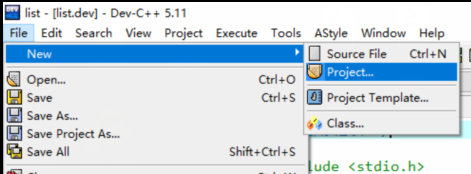1. 在Windows下需要在一個工程project下才能進行多檔案編譯。用的IDE是Dev c++ 5.11

簡單介紹:
.h 檔案:主要是結構定義,函數簽名, 每個 .h 檔案必須有一個同名 .c 檔案, 是對 .h 檔案函數簽名的具體實作
代碼
list.h
/* list.h */
/*簡單連結清單類型的頭檔案*/
#ifndef LIST_H_
#define LIST_H_
#include <stdbool.h> // C99特性
#define TSIZE 45
struct film
{
int rating;
char title[45];
};
/*一般類型定義*/
typedef struct film Item;
typedef struct node
{
Item item;
struct node * next;
} Node;
typedef Node * List;
/* 函數原型 */
/*
操作: 初始化一個連結清單
前提條件: plist指向一個連結清單
後置條件: 連結清單初始化為空
*/
void InitializeList(List * plist);
/*
操作:确定連結清單是否為空定義,plsit指向一個已初始化的連結清單
後置條件:如果連結清單為空, 則該函數傳回真,否則傳回假
*/
bool ListIsEmpty(const List * plist);
/*
操作: 确定連結清單是否已滿, plist指向一個已初始化的連結清單
後置條件: 如果連結清單已滿, 傳回真,否則傳回假
*/
bool ListIsFull(const List * plist);
/*
操作: 确定連結清單中的項數, pList指向一個已初始化的連結清單
後置條件: 傳回連結清單中的項數
*/
unsigned int ListItemCount(const List * plist);
/*
操作: 在連結清單的末尾添加項
前提條件: item是一個待添加至連結清單的項, pList指向一個已初始化的連結清單
後置條件: 如果可以,将item添加到連結清單末尾,傳回true,否則傳回false
*/
bool AddItem(Item item, List * plist);
/*
操作: 把函數作用于連結清單中的每一項
pList指向一個已初始化的連結清單
pfun指向一個函數,該函數接受一個Item類型的參數, 且無傳回值
後置條件: pfun指向的函數作用于連結清單中的每一項一次
*/
void Traverse(const List *plist, void (*pfun)(Item item));
/*
操作: 釋放已配置設定的記憶體 (如果有的話)
pList指向一個已初始化的連結清單
後置條件: 釋放為連結清單配置設定的所有記憶體, 連結清單設定為空。
*/
void EmptyTheList(List * plist);
#endif list.c
/* list.c */
/*支援連結清單操作的函數*/
#include <stdio.h>
#include <stdlib.h>
#include "list.h"
static void CopyToNode(Item item, Node * pnode);
/*接口函數*/
/*表連結清單設定為空*/
void InitializeList(List * plist)
{
*plist = NULL;
}
/* 如果連結清單為空,傳回true */
bool ListIsEmpty(const List * plist)
{
return plist == NULL;
}
/* 如果連結清單已滿, 傳回真,否則傳回假 */
bool ListIsFull(const List * plist)
{
Node * pt;
bool full;
pt = (Node *)malloc(sizeof(Node));
if(pt == NULL)
full = true;
else
full = false;
free(pt);
return full;
}
/* 傳回節點數 */
unsigned int ListItemCount(const List * plist)
{
unsigned int count = 0;
Node *pnode = *plist;
while (pnode != NULL)
{
++count;
pnode = pnode->next;
}
return count;
}
/* 建立存儲項的節點, 并将其添加至由plist指向的清單的末尾*/
bool AddItem(Item item, List * plist)
{
Node * pnew;
Node * scan = * plist;
pnew = (Node *)malloc(sizeof(Node));
if(pnew == NULL)
return false; //配置設定存儲空間失敗,退出,并傳回false
CopyToNode(item, pnew);
pnew->next = NULL;
if (scan == NULL)
*plist = pnew;
else
{
while (scan->next != NULL)
scan = scan->next;
scan->next = pnew;
}
return true;
}
/* 通路每一個節點并執行 pfun 指向的函數*/
void Traverse(const List *plist, void (*pfun)(Item item))
{
Node *pnode = *plist;
while (pnode != NULL)
{
(*pfun)(pnode->item);
pnode = pnode->next;
}
}
/* 釋放由 malloc() 配置設定的記憶體, 設定連結清單指針為 NULL */
void EmptyTheList(List * plist)
{
Node * psave;
while (*plist != NULL)
{
psave = (*plist)->next;
free(*plist);
*plist = psave;
}
}
static void CopyToNode(Item item, Node * pnode)
{
pnode->item = item; /* 拷貝結構 */
} movie.c
/* movie.c */
/* 使用連結清單 */
#include <stdio.h>
#include <stdlib.h>
#include <string.h>
#include "list.h"
void showmovies(Item item);
char * s_gets(char * st, int n);
int main()
{
List movies;
Item temp;
// 初始化
InitializeList(&movies);
if (ListIsFull(&movies))
{
fprintf(stderr, "No memory available! Bye!\n");
exit(1);
}
/* 擷取使用者輸入并存儲 */
puts("Enter first movie title:");
while (s_gets(temp.title, TSIZE) != NULL && temp.title[0] != '\0')
{
puts("Enter your rating <0-10>:");
scanf("%d", &temp.rating);
while(getchar() != '\n')
continue;
if (AddItem(temp, &movies) == false)
{
fprintf(stderr, "Problem allocating memory\n");
break;
}
if(ListIsFull(&movies))
{
puts("The list is now full.");
break;
}
puts("Enter next movie title (empty line to stop):");
}
if(ListIsEmpty(&movies))
printf("No data entered. ");
else
{
printf("Here is the mpvie list:\n");
Traverse(&movies, showmovies);
}
printf("You entered %d movies. \n", ListItemCount(&movies));
/* 清理 */
EmptyTheList(&movies);
printf("Bye!\n");
return 0;
}
void showmovies(Item item)
{
printf("Movie: %s, Rating: %d\n", item.title, item.rating);
}
char * s_gets(char *st, int n)
{
char * ret_val;
char * find;
ret_val = fgets(st, n, stdin);
if (ret_val)
{
find = strchr(st, '\n'); //查找換行符
if (find) //如果位址不是NULL
*find = '\0'; //在此放置一個空字元
else
while (getchar() != '\n')
continue; //處理輸入行中剩餘的字元
}
return ret_val;
}
/*
output:
Enter first movie title:
weqer
Enter your rating <0-10>:
5
Enter next movie title (empty line to stop):
e212e
Enter your rating <0-10>:
6
Enter next movie title (empty line to stop):
Here is the mpvie list:
Movie: weqer, Rating: 5
Movie: e212e, Rating: 6
You entered 2 movies.
Bye!
*/ 檔案之間的關系, 我用的不是film3.c,是movie.c